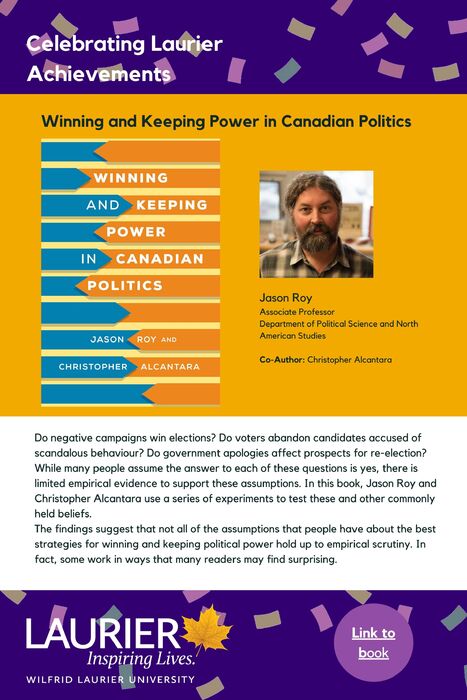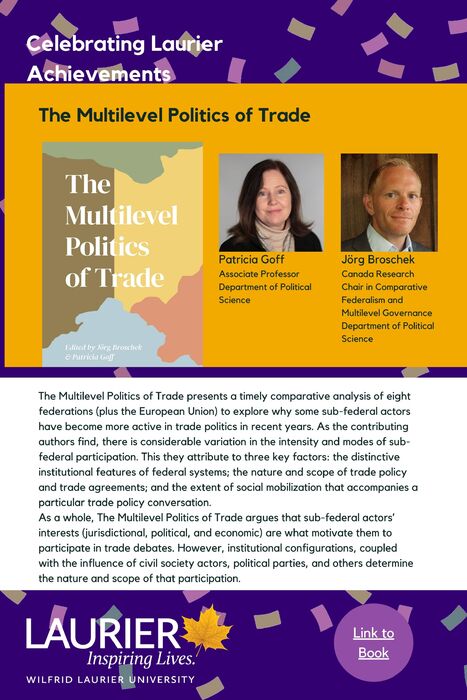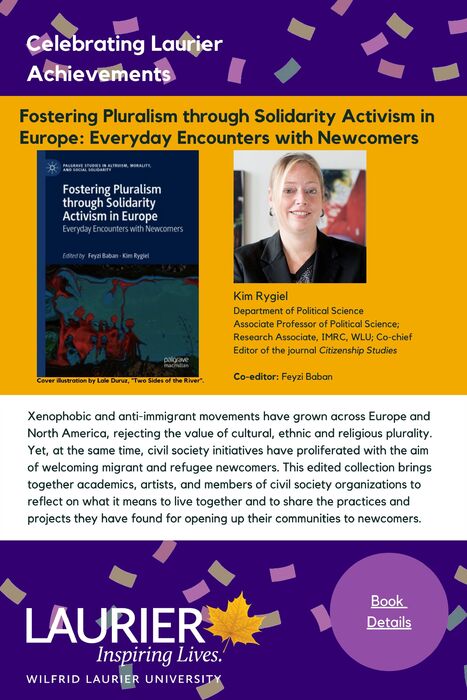-
 Winning and Keeping Power in Canadian Politics
Winning and Keeping Power in Canadian Politics Do negative campaigns win elections? Do voters abandon candidates accused of scandalous behaviour? Do government apologies affect prospects for re-election? While many people assume the answer to each of these questions is yes, there is limited empirical evidence to support these assumptions. In this book, Jason Roy and Christopher Alcantara use a series of experiments to test these and other commonly held beliefs.
The findings suggest that not all of the assumptions that people have about the best strategies for winning and keeping political power hold up to empirical scrutiny. In fact, some work in ways that many readers may find surprising.
-
 The Multilevel Politics of Trade
The Multilevel Politics of Trade The Multilevel Politics of Trade presents a timely comparative analysis of eight federations (plus the European Union) to explore why some sub-federal actors have become more active in trade politics in recent years. As the contributing authors find, there is considerable variation in the intensity and modes of sub-federal participation. This they attribute to three key factors: the distinctive institutional features of federal systems; the nature and scope of trade policy and trade agreements; and the extent of social mobilization that accompanies a particular trade policy conversation.
As a whole, The Multilevel Politics of Trade argues that sub-federal actors’ interests (jurisdictional, political, and economic) are what motivate them to participate in trade debates. However, institutional configurations, coupled with the influence of civil society actors, political parties, and others determine the nature and scope of that participation.
-
 Fostering Pluralism through Solidarity Activism in Europe Everyday Encounters with Newcomers
Fostering Pluralism through Solidarity Activism in Europe Everyday Encounters with Newcomers Xenophobic and anti-immigrant movements have grown across Europe and North America, rejecting the value of cultural, ethnic and religious plurality. Yet, at the same time, civil society initiatives have proliferated with the aim of welcoming migrant and refugee newcomers. This edited collection brings together academics, artists, and members of civil society organizations to reflect on what it means to live together and to share the practices and projects they have found for opening up their communities to newcomers.
-
 Women as War Criminals: Gender, Agency, and Justice
Women as War Criminals: Gender, Agency, and Justice Women war criminals are far more common than we think. From the Holocaust to ethnic cleansing in the Balkans to the Rwandan genocide, women have perpetrated heinous crimes. Few have been punished. These women go unnoticed because their very existence challenges our assumptions about war and about women. Biases about women as peaceful and innocent prevent us from "seeing" women as war criminals—and prevent postconflict justice systems from assigning women blame.
 Winning and Keeping Power in Canadian Politics Do negative campaigns win elections? Do voters abandon candidates accused of scandalous behaviour? Do government apologies affect prospects for re-election? While many people assume the answer to each of these questions is yes, there is limited empirical evidence to support these assumptions. In this book, Jason Roy and Christopher Alcantara use a series of experiments to test these and other commonly held beliefs. The findings suggest that not all of the assumptions that people have about the best strategies for winning and keeping political power hold up to empirical scrutiny. In fact, some work in ways that many readers may find surprising.
Winning and Keeping Power in Canadian Politics Do negative campaigns win elections? Do voters abandon candidates accused of scandalous behaviour? Do government apologies affect prospects for re-election? While many people assume the answer to each of these questions is yes, there is limited empirical evidence to support these assumptions. In this book, Jason Roy and Christopher Alcantara use a series of experiments to test these and other commonly held beliefs. The findings suggest that not all of the assumptions that people have about the best strategies for winning and keeping political power hold up to empirical scrutiny. In fact, some work in ways that many readers may find surprising. The Multilevel Politics of Trade The Multilevel Politics of Trade presents a timely comparative analysis of eight federations (plus the European Union) to explore why some sub-federal actors have become more active in trade politics in recent years. As the contributing authors find, there is considerable variation in the intensity and modes of sub-federal participation. This they attribute to three key factors: the distinctive institutional features of federal systems; the nature and scope of trade policy and trade agreements; and the extent of social mobilization that accompanies a particular trade policy conversation. As a whole, The Multilevel Politics of Trade argues that sub-federal actors’ interests (jurisdictional, political, and economic) are what motivate them to participate in trade debates. However, institutional configurations, coupled with the influence of civil society actors, political parties, and others determine the nature and scope of that participation.
The Multilevel Politics of Trade The Multilevel Politics of Trade presents a timely comparative analysis of eight federations (plus the European Union) to explore why some sub-federal actors have become more active in trade politics in recent years. As the contributing authors find, there is considerable variation in the intensity and modes of sub-federal participation. This they attribute to three key factors: the distinctive institutional features of federal systems; the nature and scope of trade policy and trade agreements; and the extent of social mobilization that accompanies a particular trade policy conversation. As a whole, The Multilevel Politics of Trade argues that sub-federal actors’ interests (jurisdictional, political, and economic) are what motivate them to participate in trade debates. However, institutional configurations, coupled with the influence of civil society actors, political parties, and others determine the nature and scope of that participation. Fostering Pluralism through Solidarity Activism in Europe Everyday Encounters with Newcomers Xenophobic and anti-immigrant movements have grown across Europe and North America, rejecting the value of cultural, ethnic and religious plurality. Yet, at the same time, civil society initiatives have proliferated with the aim of welcoming migrant and refugee newcomers. This edited collection brings together academics, artists, and members of civil society organizations to reflect on what it means to live together and to share the practices and projects they have found for opening up their communities to newcomers.
Fostering Pluralism through Solidarity Activism in Europe Everyday Encounters with Newcomers Xenophobic and anti-immigrant movements have grown across Europe and North America, rejecting the value of cultural, ethnic and religious plurality. Yet, at the same time, civil society initiatives have proliferated with the aim of welcoming migrant and refugee newcomers. This edited collection brings together academics, artists, and members of civil society organizations to reflect on what it means to live together and to share the practices and projects they have found for opening up their communities to newcomers. Women as War Criminals: Gender, Agency, and Justice Women war criminals are far more common than we think. From the Holocaust to ethnic cleansing in the Balkans to the Rwandan genocide, women have perpetrated heinous crimes. Few have been punished. These women go unnoticed because their very existence challenges our assumptions about war and about women. Biases about women as peaceful and innocent prevent us from "seeing" women as war criminals—and prevent postconflict justice systems from assigning women blame.
Women as War Criminals: Gender, Agency, and Justice Women war criminals are far more common than we think. From the Holocaust to ethnic cleansing in the Balkans to the Rwandan genocide, women have perpetrated heinous crimes. Few have been punished. These women go unnoticed because their very existence challenges our assumptions about war and about women. Biases about women as peaceful and innocent prevent us from "seeing" women as war criminals—and prevent postconflict justice systems from assigning women blame.